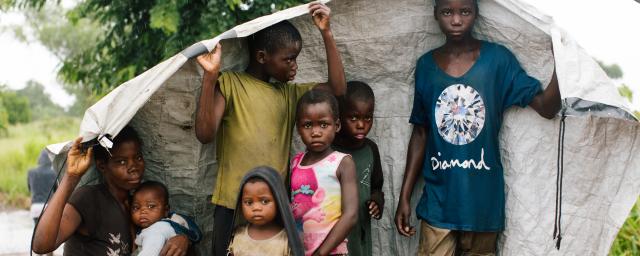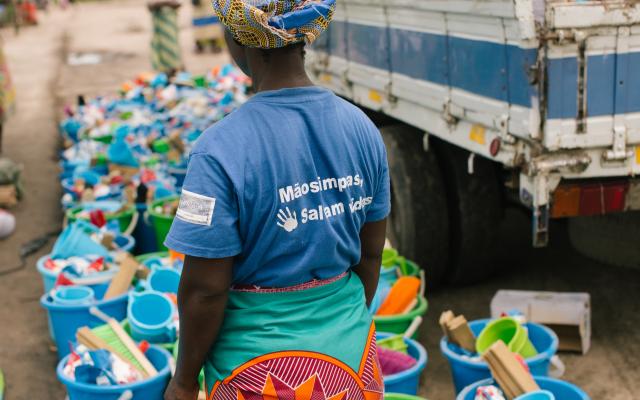
Maria, 31, with her six children sheltering from the rain by the side of the road. 24 hours before this photo was taken the rain came and the river banks burst causing their home to flood. Fearing another cyclone was coming they gathered all their life belongings and came to higher ground. Photo: Elena Heatherwick/Oxfam
On the night of 14-15 March 2019, Cyclone Idai hit landfall in Beira, Mozambique, killing over 1,000 people across Mozambique, Malawi and Zimbabwe and leaving 2.6 million people in desperate need of humanitarian assistance.
Catastrophic damage, caused by strong winds and extensive flooding, wiped away harvests and destroyed seed stocks. Millions lost their homes and livelihoods.
Almost one year on, more than 8.7 million people do not have enough food or water, and over 100,000 people in Mozambique are still living in temporary shelters.
Climate shocks
Idai was not an isolated incident. A series of increasingly frequent and severe weather events magnified Idai’s impact. An El Niño drought, intensified by climate change, had gripped Southern Africa for months before Idai hit. This rendered the land more susceptible to flooding.
Six weeks after Idai, Cyclone Kenneth battered the northern coast of Mozambique. For the first time in recorded history, two strong tropical cyclones had hit Mozambique during the same season.

Elsa, 39, a community activist at a hygiene kit distribution in Mandruzi resettlement camp. Hygiene kits were being distributed because recent flooding had contaminated water and cause latrines to flood at the camp. Photo: Elena Heatherwick/Oxfam
Deepening inequality
Climate impacts are devastating for everyone. However, inequalities - between the rich and the poor, and between genders – often deepen in times of crisis, meaning that impacts are felt differently within and between communities.
People in poverty are always hardest hit. In Beira, a city that was decimated by Idai, the worst affected were those living in poorly constructed shelters, vulnerable to the floods and winds brought by the cyclone.
Women and girls face an additional burden, too. The unpaid care responsibilities of women were affected by the storm. They face longer distances to water points and sanitation facilities, increasing the risk of gender-based violence. With only a fraction of women holding official land titles, they are less able to protect their land when it is safe to return.
Oxfam is now working to help communities adapt to a changing climate – for example, helping smallholder farmers to diversify their crops and adapt their farming techniques.
Now, as we mark 12 months since Cyclone Idai, we stand in solidarity with communities still recovering, and we celebrate the women who, despite losing everything, still work tirelessly to support each other and rebuild their lives.
You can be a #ClimateChanger
The climate crisis is already wrecking the lives of millions of people, and those who did the least to cause the problem are the worst affected.
Every one of us has a part to play – and we must act now.
Join our global community of #ClimateChangers to take action and help us tackle the biggest challenge humanity has ever faced.